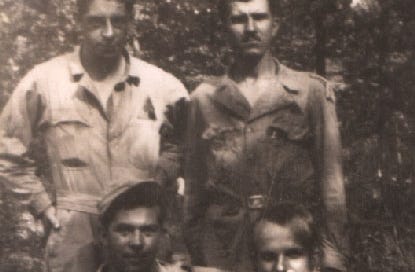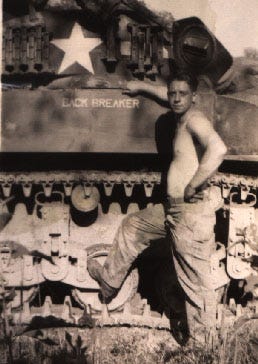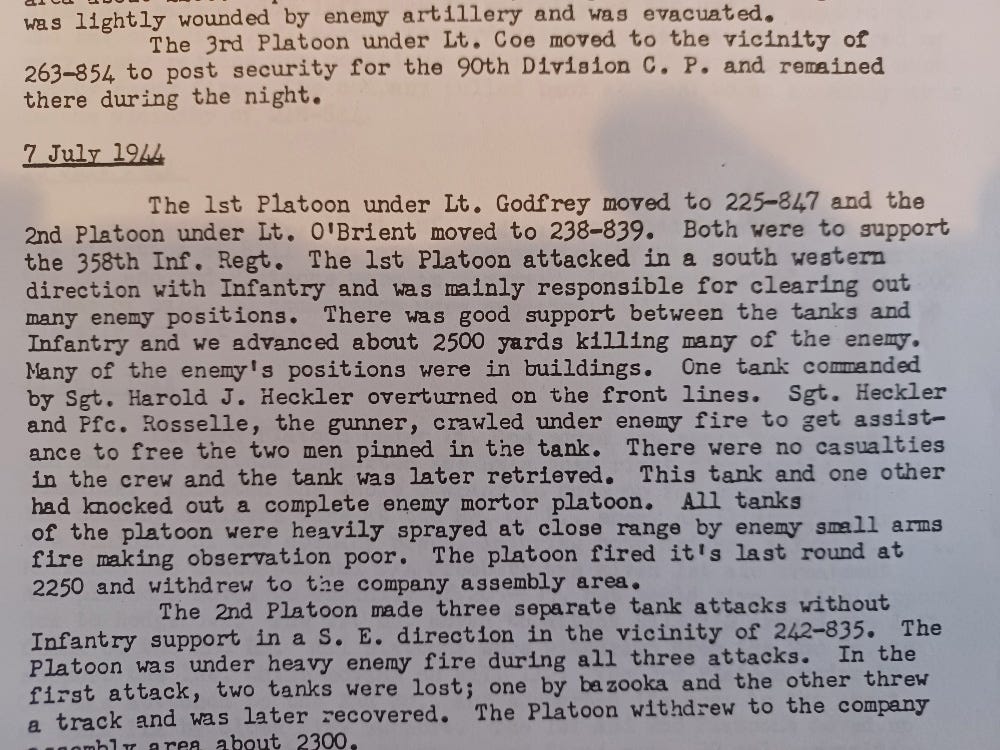In revisiting the death of Sergeant Harold Heckler of my father’s 712th Tank Battalion, I discovered a mistake I made in “Tanks for the Memories.” I attributed his death to the battalion’s first day in combat, July 3, 1944, when it actually occurred July 14. In retrospect, one of the D Company veterans may have said Heckler was the first member of the company to be killed, and I mistakenly assumed he was killed on the first day in combat. In doing so, I overlooked an act of heroism by Heckler before he died. (D Company was the battalion’s three five-tank platoons of M3 Stuart “light” tanks.)
I discovered the act of heroism while scouring after action reports and other documents for references to an unrelated incident. This led me to take a deep dive into how I could have made such a mistake. I found that in my 1999 interview with Lex Obrient, Heckler’s platoon leader, I asked if the incident took place on the first day in combat. His response: “About. Pretty much so. I don’t know.”
A few years earlier, in 1995, I went to Chicago to interview Andy Schifler and Hilding Freeberg, both of whom were in Heckler’s platoon, although at that point I had not heard of the incident in which he was killed]. I’m talking some serious serendipity here. First, I interviewed Andy.
Andy Schifler: I talked to whatsisname that got killed, too, but I don't want to mention that, by our own gun.
Aaron Elson: Really?
Andy Schifler: By our own guns. I wouldn't say the name of the guy; it was all an accident. We were all waiting to go; they were supposed to go up on a hill, in order to mount up. I'm talking to him, and he's right behind a gun where the assistant driver is. He jumped in and he didn't have the safety on. And I'd just moved away and he shot the guy right in the back.
Aaron Elson: You had just moved away, and this...Was that the...
Andy Schifler: See, I was talking to him. We were resting and talking. And the gun is right behind him. But when they said "Mount up," I got up and moved a little, and in the meantime when the assistant driver jumped in, the machine gun went off. See, there's a lot of Americans killed by their own guns...
In 1941, long before the 712th Tank Battalion was formed, 600 recruits from the Chicago area were sent to Camp Seeley, California, to join the 11th (horse) Cavalry. The 11th would be mechanized as part of the 10th Armored Division and in 1943 the 712th would be broke out of the 10th as an independent battalion. Both Schifler and Freeberg were among those 600 recruits.
The following day I visited Hilding and Alice Freeberg in another part of Chicago. We were talking about reunions and I said something about a member of Service Company who was deeply affected by the death of a buddy, and Alice said, “Oh, Hil had a dear friend killed there, too.”
Hilding Freeberg: Heckler.
Aaron Elson: Heckler?
Hilding Freeberg: Heckler, yeah.
Alice Freeberg: What was Heckler's, I've forgotten his first name.
Hilding Freeberg: Everybody called him Heckler. I can't think of his first name. He was shot by our own gun.
I suddenly realized that this was the person whose name Andy Schifler wouldn’t mention, possibly because there might be some stigma attached to a friendly fire incident, or his family might not have known how he died.
Hilding Freeberg: They were just out with the light tanks, and they came in, and he jumped off the tank, and I think our lieutenant went to talk to them and greet them. He was standing in front of the bow gunner, and down below, and he hollered up to, "Clear your guns up there," and he said, "You too in there." He hollered in to the machine gunner. When he unloaded the gun, three shots went out, and Heckler was right in front of it.
Later in 1995 I traveled to northern California and southern Oregon to interview Dess Tibbitts, a driver in A Company, who lived in Orland, Calif.; and Dale Albee, a lieutenant in D Company, in Prospect, Oregon. Dale was not present when Heckler was killed but had trained with him in the cavalry. In his photo album, he had a photo of Heckler and his crew.
Aaron Elson: Okay, now let's go back to Normandy, and take the incidents one at a time. Starting with...
Dale Albee: Hedgerows?
Aaron Elson: No, with Heckler.
Dale Albee: Okay. Sergeant Heckler, his crew was, I believe Jezuit...
Aaron Elson: Jezuit? Wait. Okay, there was somebody named Jarusz in C Company who was killed, Jezuit, okay.
Aaron Elson: Art Horn loaned me a couple of pictures to use for the book, and one of them is, if you could identify the people in this picture, that would be a big help...
Dale Albee: That's the same picture right here. Yes indeed, that's Heckler, Jezuit, Roselle and Ezerskis.
Aaron Elson: Heckler is here [top left]?
Dale Albee: Yes. Heckler...Jezuit...and then Roselle and Ezerskis. What I did is, I went from the back, Heckler, Jezuit. And then Roselle, Ezerskis. I think Ezerskis was the driver, Jezuit was the bow gunner. So Jezuit may have been the one that kicked the gun, and shot Heckler.
A few years later, in 1999, I visited Lex Obrient in Albuquerque, and the subject of Harold Heckler came up almost immediately.
Lex O’Brient: What do you know about him (Harold Heckler)?
Aaron Elson: When I interviewed Andy Schifler, he would not mention Heckler’s name. He told me what happened, but I believe his family may have thought he was killed in action, but Andy would not say Heckler by name, because I guess there was a memorial service after the war, his family didn’t know the circumstances. That was the impression I got.
Lex O’Brient: Let me tell you about it, because I was standing right, I had just finished talking to him, and Lord, I don’t remember what I had said, I don’t remember that part. But anyway, I [he gets all choked up]
Aaron Elson: That’s okay. Usually this happens much later [in an interview]. I cry a lot listening to these interviews. Take your time, that’s quite all right.
Lex O’Brient: Whatever we had been talking about, I turned around and I went back to my tank, and then I heard a burst, about two or three rounds I guess, I don’t know how many. But I turned around and I looked, and there he is lying on the ground. I’ll tell you, I felt awful about that.
Aaron Elson: Was that the first day in combat?
Lex O’Brient: About. Pretty much so. I don’t know, like I say, I can’t remember what we had been talking about, and Andy was there too, Andrew, I tell you, we were just getting ready to move out, and when I saw that. ... Here’s what happened. The man who was the bow gunner on that tank was getting into the hatch and his foot hit the machine gun, the .30-caliber, and I tell you, if I had been standing, I guess if I hadn’t turned around and was in the process of walking away, who knows, maybe it would have been me, but it was not. It was all just a big accident. But when I turned around I was in a state of shock, I mean there he is, I had just been talking to him, and then to see him there, and that was instant, I mean he, I can right now, I can’t remember whether it caught him in the...
Aaron Elson: I think in the abdomen or the groin.
Lex O’Brient: Yeah, because he reached, that’s right, I do remember that, he was kind of, and then after that he was dead. But it just caught him, a couple right in, because you know, the .30-caliber machine gun is already pretty low, and to step on it, and I think in order for that thing to have happened when the man was getting in the tank, I think his foot must have come up underneath, otherwise it would have never fired it. But that’s what happened. I was standing right there when it happened. But then he was one of the people I was gonna ask you if you had interviewed anybody, but you did talk to Andy?
Aaron Elson: Andy, and then Hilding Freeberg, and he’s passed away.
Lex O’Brient: Freeberg’s passed away now?
Aaron Elson: Yes. He died about a year and a half ago. But he was wonderful to meet and talk to.
Lex O’Brient: He sure was.
Aaron Elson: When Andy wouldn’t mention Heckler’s name, Hilding said, “Did Andy tell you about Heckler?” So I was able to put two and two together.
The above entry in the battalion after action reports is where I first went astray. Noting the insert in the report and realizing it must refer to Sergeant Heckler, I guessed, wrongly, that he might have been evacuated and that it was not learned until then that he died.
Sergeant Heckler’s date of death is corroborated in a more detailed but unofficial D Company log about while I’ll write more in future Substacks.
Which brings me to the entry in the unofficial D Company log for July 7, 1944, and Sergeant Heckler’s act of heroism.
One tank commanded by Sgt. Harold J. Heckler overturned on the front lines. Sgt. Heckler and Pfc. Rosselle [Roselle?], the gunner, crawled under enemy fire to get assistance to free the two men pinned in the tank. There were no casualties in the crew and the tank was later retrieved. This tank and one other had knocked out a complete enemy mortar platoon.
In a tragic footnote, barely a month after Heckler’s death, on August 12, 1944, Heckler’s entire three-man crew and Sgt. Everett McNulty, who took Heckler’s place, were killed when their tank took a direct hit from a German Mark V tank.









Great post. Thanks for all your efforts in the accuracy of your Dad's tank unit, thanks for all your hard work and very unique style!!